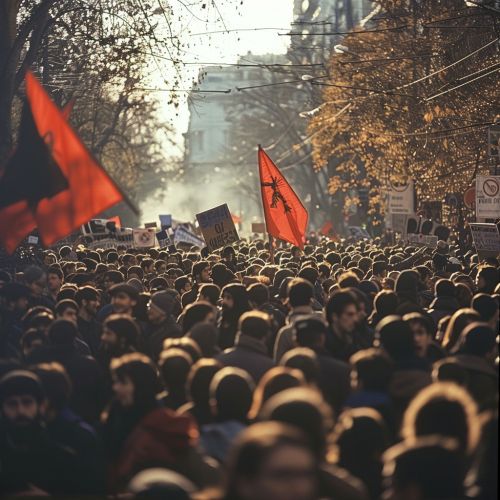Political instability: Difference between revisions
(Created page with "== Definition and Overview == Political instability refers to the propensity for regime or government change, political upheaval, or violence in society, or instability and uncertainty in government policy, causing rapid and significant change in the environment in which businesses operate. It is a condition of a country where a government either collapses or is in danger of collapse. The term may also refer to a situation where the rate of change of the basic structure...") |
No edit summary |
||
| Line 11: | Line 11: | ||
Economic factors play a significant role in political instability. High levels of [[Economic Inequality|economic inequality]], unemployment, inflation, and a lack of economic opportunity can lead to dissatisfaction among the population, which can result in political instability. Economic crises can also lead to political instability, as they can cause social unrest and dissatisfaction with the government. | Economic factors play a significant role in political instability. High levels of [[Economic Inequality|economic inequality]], unemployment, inflation, and a lack of economic opportunity can lead to dissatisfaction among the population, which can result in political instability. Economic crises can also lead to political instability, as they can cause social unrest and dissatisfaction with the government. | ||
[[Image:Detail-77785.jpg|thumb|center|A crowd of people protesting in the streets during an economic crisis.]] | |||
=== Social Inequality === | === Social Inequality === | ||
Revision as of 19:09, 7 May 2024
Definition and Overview
Political instability refers to the propensity for regime or government change, political upheaval, or violence in society, or instability and uncertainty in government policy, causing rapid and significant change in the environment in which businesses operate. It is a condition of a country where a government either collapses or is in danger of collapse. The term may also refer to a situation where the rate of change of the basic structures of a society is rapid and discontinuous. Political science often studies the causes and impacts of political instability.
Causes of Political Instability
There are numerous causes of political instability. These can range from economic factors, social inequality, ethnic diversity, religious or sectarian tensions, to foreign intervention and historical legacies.
Economic Factors
Economic factors play a significant role in political instability. High levels of economic inequality, unemployment, inflation, and a lack of economic opportunity can lead to dissatisfaction among the population, which can result in political instability. Economic crises can also lead to political instability, as they can cause social unrest and dissatisfaction with the government.

Social Inequality
Social inequality is another major cause of political instability. When certain groups in society feel that they are being treated unfairly or that their needs and concerns are not being addressed by the government, this can lead to social unrest and political instability. This can be particularly acute in societies with high levels of income inequality or where there are significant disparities in access to resources and opportunities.
Ethnic Diversity and Religious or Sectarian Tensions
In countries with high levels of ethnic diversity or religious or sectarian tensions, political instability can often occur. This is particularly the case when different ethnic or religious groups are competing for power or resources, or when there is a history of conflict or tension between different groups.
Foreign Intervention
Foreign intervention can also lead to political instability. This can occur when foreign powers intervene in the affairs of a country, either through military intervention, economic pressure, or other forms of interference. This can destabilize the political situation and lead to conflict and instability.
Historical Legacies
Historical legacies can also play a role in political instability. For example, countries that have a history of colonialism, slavery, or other forms of oppression may experience political instability as they struggle to deal with the legacy of these issues.
Effects of Political Instability
Political instability can have a wide range of effects, both within a country and internationally.
Domestic Effects
Within a country, political instability can lead to a variety of negative outcomes. These can include economic decline, social unrest, and even violence or civil war. Political instability can also lead to a breakdown in law and order, and can result in a lack of basic services such as healthcare, education, and infrastructure.
International Effects
Internationally, political instability can have significant effects. It can lead to refugee crises, as people flee unstable countries in search of safety. It can also impact global markets, as instability in one country can affect the economic stability of other countries. Additionally, political instability can lead to international conflict, as other countries may intervene in an unstable country.
Mitigating Political Instability
There are various strategies and approaches that can be used to mitigate political instability. These can range from economic reforms, social policies, conflict resolution strategies, to international intervention.
Economic Reforms
Economic reforms can play a key role in mitigating political instability. By addressing economic inequality and creating opportunities for economic growth, governments can help to reduce the dissatisfaction that can lead to instability.
Social Policies
Social policies can also play a role in mitigating political instability. By addressing social inequality and ensuring that all groups in society have access to resources and opportunities, governments can help to reduce the tensions that can lead to instability.
Conflict Resolution Strategies
Conflict resolution strategies can be used to mitigate political instability in countries with high levels of ethnic or religious tension. These strategies can include negotiation, mediation, and reconciliation processes.
International Intervention
In some cases, international intervention may be necessary to mitigate political instability. This can take the form of humanitarian aid, peacekeeping missions, or other forms of intervention.
